Rahnuma forwarded me Laily’s wrenching FaceBook post. Her father is dying, far away in a UK hospital. Heart breaking, holding back tears, she and her family watch from afar. Unable to touch, to hold, to caress the person who is dearest to them. This is what Corona means in real terms. It was through her research on one of my heroes, the peasant leader Abdul Hamid Khan Bhashani, and later through them staying at the Pathshala Guest House, that we got to know her. Bhashani’s principle of putting nation before self and his simple lifestyle is a very distant reality from the ruling politicians of today. Despite its pain, Laily’s post reminded me of my own dad and my childhood. I remembered dad resting in his easy chair. His belly just the right slope for us kids to use as a living slide. We used to call him bhalluk (bear), and every day as he rested after lunch, my cousins and I would line up behind the easy chair, clamber up to his shoulders and slide down his belly. Mum would freak out, as my dad had osteomyelitis as a child and had never fully recovered. His shins were always exposed and very fragile. Quite apart from wanting him to rest, the idea that we might aggravate his injury worried her. Abba was unperturbed, happy to be teddy bear to a room full of kids. We’d run back to the end of the queue to slide down again. We were always tired before Abba ever did. We didn’t think of it as physical contact in those days. When Abba died, I remember feeling the stubble that had grown on his soft skin, as I stroked him before we laid him down.
Newcomers to Bangladesh are overwhelmed by the generosity of our village folk. They love it when strangers clasp their hands, but are somewhat unsure when seconds, sometimes minutes pass, before their hands are reluctantly released. Years ago, when we at Drik were trying to improve our English skills, we struck a deal with the local office of the British Council. Unable to pay for the expensive English classes, we negotiated a barter. We would do their photography. They in turn, would teach us English. It wasn’t just language skills though, it was learning English culture. One of the first things our English teachers told us was to release the hand quickly! Prolonged physical contact could make the English squirm.





